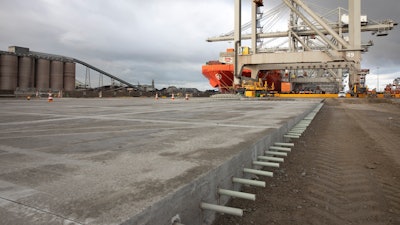Discovering the Benefits of Composites in Construction
Discovering the Benefits of Composites in Construction
Blog Article
The Role of Recycled Compounds: Enhancing Performance and Sustainability Efforts
In today's ever-evolving landscape of materials engineering and sustainability efforts, the application of recycled composites has actually emerged as an engaging area of interest. By harnessing the power of recycled compounds, organizations can not only boost their operational efficiency and product quality however likewise contribute to an extra lasting future.
Advantages of Recycled Compounds
Recycled composites provide a sustainable solution that not only boosts performance however also minimizes ecological influence in different sectors. Among the essential advantages of using recycled composites is their capability to divert waste from landfills. By incorporating materials such as recycled plastics or carbon fiber into making processes, companies can lower the quantity of waste produced and advertise a circular economic climate.
Moreover, recycled composites typically show similar and even superior mechanical residential or commercial properties to virgin materials. This means that products made from recycled compounds can preserve high performance requirements while being a lot more eco-friendly. Additionally, using recycled compounds can aid companies meet their sustainability goals and minimize their carbon footprint.

Performance Benefits of Recycled Compounds
Enhancing architectural integrity and toughness, recycled compounds supply notable efficiency advantages in numerous industrial applications. One substantial advantage is the enhanced strength-to-weight ratio that reused compounds supply. This residential property is especially critical in markets such as aerospace, vehicle, and building, where light-weight materials that keep high strength are extremely sought after.

In addition, recycled composites use superior fatigue resistance compared to lots of standard materials - composites. This characteristic is crucial in sectors subject to cyclic loading or vibrant stresses, as it aids avoid premature failure and guarantees lasting reliability
In addition, recycled composites can be customized to fulfill particular efficiency needs by adjusting the kind and percentage of recycled products made use of in their manufacturing process. This personalization ability permits for the advancement of high-performance composites that address the special needs of various markets, even more highlighting the efficiency benefits of recycled composites.
Environmental Impact of Recycled Composites
The fostering of recycled compounds in numerous sectors has prompted a better evaluation of their ecological impact. When analyzing the ecological effects of recycled composites, it is vital to think about both their manufacturing process and end-of-life disposal. In comparison to conventional compounds, recycled compounds provide the benefit of drawing away waste from landfills and decreasing the need for basic materials removal (composites). This element adds to decrease energy usage and greenhouse gas discharges throughout the manufacturing phase, aligning with sustainability goals.
By integrating recycled materials into brand-new composite items, firms can contribute to resource preservation and waste decrease initiatives. Continued research study and advancement in this field are important to maximize the ecological performance of recycled composites and breakthrough sustainable methods throughout sectors.
Applications of Recycled Composites
Numerous sectors have accepted the use of recycled compounds as a result of their adaptability and performance-enhancing residential or commercial properties. Among the key applications of recycled compounds is in the automobile industry, where they are utilized to manufacture Visit Your URL light-weight components such as bumpers, indoor panels, and under-the-hood components. These composites assist lower the total weight of vehicles, boosting fuel performance and decreasing carbon exhausts.
In the construction market, recycled composites are increasingly being utilized to produce durable and weather-resistant structure materials. These materials use high strength-to-weight ratios, making them perfect for applications such as roof covering, cladding, and outdoor decking. Furthermore, making use of recycled compounds in framework tasks, such as tunnels and bridges, has actually gained traction because of their long life and resistance to deterioration.
Furthermore, the aerospace market depends on recycled composites to produce airplane components that need high stamina and rigidity. These composites play a critical duty in improving the performance and fuel efficiency of airplane while minimizing maintenance expenses. Generally, the diverse applications of recycled composites across industries highlight their considerable contribution to boosting sustainability initiatives and improving performance requirements.
Future Expectation for Recycled Composites
With an increasing concentrate on sustainability and development, the future expectation for recycled composites in various industries appears promising. As companies make every effort to meet ecological objectives and reduce their carbon impact, the need for sustainable official statement materials like recycled composites is anticipated to climb dramatically. Industries such as vehicle, construction, aerospace, and customer products are significantly turning to recycled composites because of their light-weight, resilient, and environmentally friendly buildings.
In the auto industry, using recycled compounds in lorry production is forecasted to raise as automakers seek to generate lighter and a lot more fuel-efficient lorries. In the browse around this site building sector, there is an expanding passion in using recycled compounds for framework jobs to reduce waste and enhance sustainability. The aerospace industry is additionally checking out the capacity of recycled compounds for airplane parts to enhance fuel effectiveness and minimize discharges.
Verdict
The applications of recycled composites are substantial, ranging from building and construction to auto industries. Relocating forward, the usage of recycled composites is expected to continue to grow as firms and sectors focus on sustainability efforts in their operations.
In today's ever-evolving landscape of materials design and sustainability efforts, the use of recycled composites has emerged as a compelling location of interest. In contrast to conventional composites, recycled compounds offer the advantage of diverting waste from land fills and decreasing the requirement for raw products extraction. By incorporating recycled products into new composite items, companies can contribute to source conservation and waste decrease initiatives.In the building industry, recycled compounds are increasingly being utilized to create resilient and weather-resistant building materials. As companies aim to fulfill environmental objectives and minimize their carbon impact, the demand for sustainable materials like recycled composites is anticipated to increase significantly.
Report this page